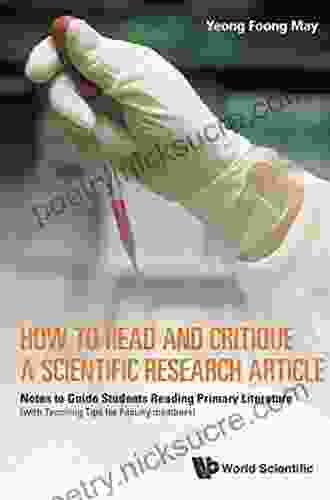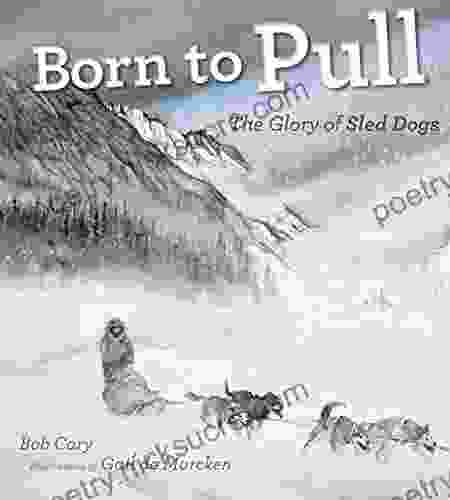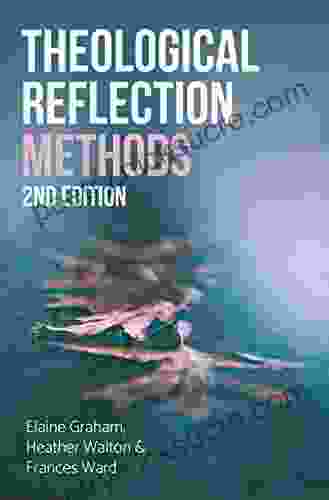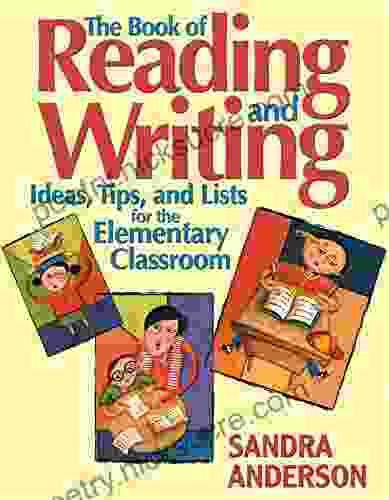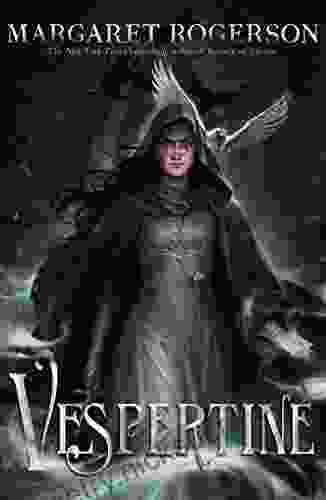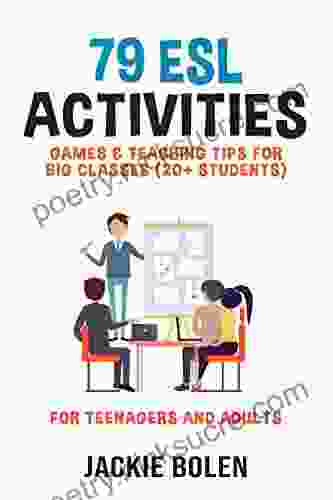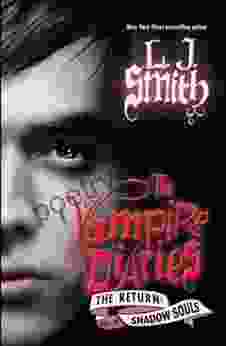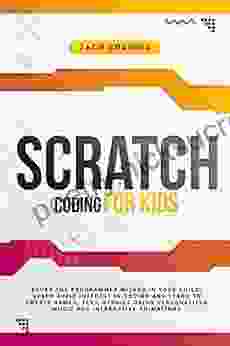Notes to Guide Students Reading Primary Literature with Teaching Tips

Primary literature is a vital tool for students in understanding the history and development of their field of study. It provides them with first-hand accounts of the research and discoveries that have shaped their discipline. However, reading primary literature can be a challenging task for students, as it is often written in a dense and technical style that can be difficult to understand. This guide provides notes to help students read primary literature more effectively, as well as teaching tips for instructors to use in the classroom.
Notes for Students
- Before You Read:
- Read the abstract. The abstract is a brief summary of the article that will provide you with an overview of the main points. This will help you to focus your reading and to identify the key concepts that you need to understand.
- Read the . The will provide you with the background information that you need to understand the article. This will include the context of the research, the main research questions, and the methods that were used.
- Skim the headings and subheadings. This will give you a general overview of the structure of the article and will help you to identify the main sections.
- Take notes. As you read, take notes on the main points of the article. This will help you to remember the key concepts and to follow the argument of the author.
- Highlight important passages. As you read, highlight important passages that you want to remember or that you may want to come back to later.
- Look up unfamiliar terms. If you come across any unfamiliar terms, look them up in a dictionary or online. This will help you to understand the meaning of the term and to follow the argument of the author.
- Identify the author's argument. As you read, try to identify the author's main argument. This will help you to understand the purpose of the article and to follow the author's train of thought.
- Evaluate the evidence. As you read, evaluate the evidence that the author presents to support their argument. Is the evidence valid and reliable? Does it support the author's claims?
- Summarize the article. Once you have finished reading the article, write a brief summary of the main points. This will help you to review the material and to check your understanding.
- Reflect on the article. Take some time to reflect on the article that you have read. What did you learn from it? How did it challenge your thinking? What questions do you still have?
Teaching Tips
- Provide students with background information. Before students begin reading primary literature, provide them with the necessary background information to help them understand the context of the research. This can include information about the history of the field, the major theoretical perspectives, and the key methodologies.
- Teach students how to read effectively. Teach students the effective reading strategies that are outlined in the notes for students section above. These strategies will help students to identify the main points of the article, to follow the argument of the author, and to evaluate the evidence.
- Provide opportunities for students to practice reading primary literature. The best way for students to learn how to read primary literature is to practice. Provide them with opportunities to read and discuss primary literature in class. This will help them to develop their skills and to gain confidence in their ability to read this type of material.
- Encourage students to ask questions. Encourage students to ask questions about the primary literature that they are reading. This will help them to clarify their understanding and to identify areas where they need more information.
- Use primary literature in your teaching. Use primary literature in your teaching to help students to see how research is actually conducted and to understand the development of your field of study. This will help them to become more critical thinkers and to develop a deeper understanding of the subject matter.
Reading primary literature is a valuable skill for students in any field of study. By following the notes and tips outlined in this guide, students can learn to read primary literature effectively and to gain a deeper understanding of their field of study. Instructors can also use these tips to help students to develop their reading skills and to become more engaged in their learning.
4.5 out of 5
| Language | : | English |
| File size | : | 4175 KB |
| Text-to-Speech | : | Enabled |
| Screen Reader | : | Supported |
| Enhanced typesetting | : | Enabled |
| Word Wise | : | Enabled |
| Print length | : | 118 pages |
4.5 out of 5
| Language | : | English |
| File size | : | 4175 KB |
| Text-to-Speech | : | Enabled |
| Screen Reader | : | Supported |
| Enhanced typesetting | : | Enabled |
| Word Wise | : | Enabled |
| Print length | : | 118 pages |
Do you want to contribute by writing guest posts on this blog?
Please contact us and send us a resume of previous articles that you have written.
 Fiction
Fiction Non Fiction
Non Fiction Romance
Romance Mystery
Mystery Thriller
Thriller SciFi
SciFi Fantasy
Fantasy Horror
Horror Biography
Biography Selfhelp
Selfhelp Business
Business History
History Classics
Classics Poetry
Poetry Childrens
Childrens Young Adult
Young Adult Educational
Educational Cooking
Cooking Travel
Travel Lifestyle
Lifestyle Spirituality
Spirituality Health
Health Fitness
Fitness Technology
Technology Science
Science Arts
Arts Crafts
Crafts DIY
DIY Gardening
Gardening Petcare
Petcare Good Books
Good Books Ford R Bryan
Ford R Bryan Peyton Curley
Peyton Curley Henry Dillon
Henry Dillon Naomi Tomky
Naomi Tomky Frank Thomas
Frank Thomas E R Truitt
E R Truitt Kate Mcvaugh
Kate Mcvaugh Zach Codings
Zach Codings Paulo Guillobel
Paulo Guillobel Matthew Rudy
Matthew Rudy Julia Galef
Julia Galef Christine Hopfgarten
Christine Hopfgarten Julie A Ross
Julie A Ross Stephen Tarsitano
Stephen Tarsitano Annabel Streets
Annabel Streets Silvia M Lindtner
Silvia M Lindtner Harley Mcallister
Harley Mcallister Matthew Cobb
Matthew Cobb Bethany Saltman
Bethany Saltman Todd Denault
Todd Denault Sarah Stodola
Sarah Stodola Michael Labossiere
Michael Labossiere Brian Daccord
Brian Daccord Illustrated Edition Kindle Edition
Illustrated Edition Kindle Edition John Baichtal
John Baichtal Kristina Cowan
Kristina Cowan Horace Freeland Judson
Horace Freeland Judson Jill Lepore
Jill Lepore Nicholas Thomas
Nicholas Thomas Mike Roberts
Mike Roberts Steve Schwartz
Steve Schwartz Charles J Sanders
Charles J Sanders Sean Covey
Sean Covey Justine Gregory Williams
Justine Gregory Williams Sajni Patel
Sajni Patel Steven A Fino
Steven A Fino Eleanor J Sullivan
Eleanor J Sullivan Melanie Dickerson
Melanie Dickerson Caroline Miller
Caroline Miller Richard Appleton
Richard Appleton Fumio Sasaki
Fumio Sasaki Rick Page
Rick Page Ann Voskamp
Ann Voskamp Zoe Moore
Zoe Moore Shawn Shallow
Shawn Shallow Winton Porter
Winton Porter G Norman Lippert
G Norman Lippert Stefan Hollos
Stefan Hollos The Pinnacle Review
The Pinnacle Review Eddie Jones
Eddie Jones Kennedy Achille
Kennedy Achille Walter Mischel
Walter Mischel Julian Of Norwich
Julian Of Norwich Creative Guy
Creative Guy Lina Beard
Lina Beard Lisa Manterfield
Lisa Manterfield Rebecca Carroll
Rebecca Carroll Suzanne Clark
Suzanne Clark Maggie Downs
Maggie Downs Dannah Gresh
Dannah Gresh C W Farnsworth
C W Farnsworth Eric Greitens
Eric Greitens Arcturus Publishing
Arcturus Publishing Sheela Raja
Sheela Raja Freddy Silva
Freddy Silva Stacey A Shannon
Stacey A Shannon Scott P Sells
Scott P Sells Bert Mendelson
Bert Mendelson Sam Demas
Sam Demas Susan Spicer
Susan Spicer Lily Siou
Lily Siou Mordecai Orimiladeye
Mordecai Orimiladeye Gwen Mckee
Gwen Mckee Kalman Samuels
Kalman Samuels Susan G Solomon
Susan G Solomon James F Twyman
James F Twyman Jemar Tisby
Jemar Tisby Darryl Belfry
Darryl Belfry Bob Labbe
Bob Labbe Michael Witwer
Michael Witwer Dave Canterbury
Dave Canterbury Zach Hunter
Zach Hunter Joey Myers
Joey Myers Steve Grant
Steve Grant Helen Adrienne
Helen Adrienne Stuart Tomlinson
Stuart Tomlinson Mikael Lindnord
Mikael Lindnord Sally Connolly
Sally Connolly W W Sawyer
W W Sawyer Peter Richmond
Peter Richmond John Edwards
John Edwards Bob Madgic
Bob Madgic Ian Moulding
Ian Moulding Sally Annjanece Stevens
Sally Annjanece Stevens Geryn Childress
Geryn Childress Jennifer Dugan
Jennifer Dugan Jackson Carter
Jackson Carter Robin Esrock
Robin Esrock Bernard Stiegler
Bernard Stiegler Graham Robb
Graham Robb Livia Bitton Jackson
Livia Bitton Jackson John Van Wyhe
John Van Wyhe Paul Logothetis
Paul Logothetis Gill James
Gill James Gemma Bray
Gemma Bray Marva Boatman
Marva Boatman Anna Della Subin
Anna Della Subin Tim Cahill
Tim Cahill Robert A Conover
Robert A Conover Anna Ivey
Anna Ivey Robert F Boszhardt
Robert F Boszhardt Bob Cary
Bob Cary Peter Wacht
Peter Wacht Tony Osgood
Tony Osgood Geoff Greig
Geoff Greig Margaret Rogerson
Margaret Rogerson Stefanie Japel
Stefanie Japel Shannon Vallor
Shannon Vallor John Pullen
John Pullen Peter Watson
Peter Watson Linda K Miller
Linda K Miller Margaret Paul
Margaret Paul Ellen Dugan
Ellen Dugan Seth Stephens Davidowitz
Seth Stephens Davidowitz Les Livingstone
Les Livingstone Kathy Morey
Kathy Morey Breeda Bermingham
Breeda Bermingham Holly Chism
Holly Chism Todd Radom
Todd Radom M Terese Verklan
M Terese Verklan Marjorie Savage
Marjorie Savage Antonio Robert
Antonio Robert Asker Jeukendrup
Asker Jeukendrup Barak A Bassman
Barak A Bassman Jacob Ward
Jacob Ward Susan M Schneider
Susan M Schneider Jonathan Franklin
Jonathan Franklin J Scott Long
J Scott Long Dr Sarita Uhr
Dr Sarita Uhr Steven Munatones
Steven Munatones Patrick Torsell
Patrick Torsell Michael F Nenes
Michael F Nenes Hope Comerford
Hope Comerford Luke Schumacher
Luke Schumacher Gary Chapman
Gary Chapman Adele Faber
Adele Faber Julie C Meloni
Julie C Meloni Ariel Dalfen
Ariel Dalfen George Lakoff
George Lakoff Anna Wood
Anna Wood Rutger Bregman
Rutger Bregman Monroe Wildrose
Monroe Wildrose George James Grinnell
George James Grinnell Joy Dawson
Joy Dawson Joshua Shifrin
Joshua Shifrin Thomas A Garrity
Thomas A Garrity P M Gilbert
P M Gilbert Anne Sylvie Malbrancke
Anne Sylvie Malbrancke Lane Demas
Lane Demas Junior Health Institute
Junior Health Institute Tarani Chandola
Tarani Chandola Barb Musick
Barb Musick Michael G Manning
Michael G Manning Heidi Kreider
Heidi Kreider Carl Mckeating
Carl Mckeating Jay Spence
Jay Spence Chase Hassen
Chase Hassen Tanmay Mehta
Tanmay Mehta Suzanne Girard Eberle
Suzanne Girard Eberle Christopher T Coughlin
Christopher T Coughlin Louise Katz
Louise Katz Sean Bartram
Sean Bartram Chic Scott
Chic Scott Kass Morgan
Kass Morgan Kendall Coyne
Kendall Coyne Martin Meredith
Martin Meredith Glen E Clarke
Glen E Clarke Ann Mccallum Staats
Ann Mccallum Staats Josephine Mccarthy
Josephine Mccarthy Charles Dickens
Charles Dickens Sara Wickham
Sara Wickham Chronicle Books
Chronicle Books June Hur
June Hur Roy R Grinker
Roy R Grinker James P Sethna
James P Sethna Prime Hall
Prime Hall Christine Field
Christine Field Chris Bailey
Chris Bailey Ray Eye
Ray Eye Ling Seto
Ling Seto Mary E Pearson
Mary E Pearson John Gignilliat
John Gignilliat Jenn Bennett
Jenn Bennett Ann Marie Brown
Ann Marie Brown Peter Hathaway Capstick
Peter Hathaway Capstick Jay Allan
Jay Allan Jeff Kuehl
Jeff Kuehl Gilbert J Grant Md
Gilbert J Grant Md Claire Walter
Claire Walter L Chapman
L Chapman Richard C Schwartz
Richard C Schwartz Anna B Doe
Anna B Doe Steve Newell
Steve Newell Zach Davis
Zach Davis Ann Valett
Ann Valett Tara Haelle
Tara Haelle Joe Hyams
Joe Hyams Stacey Williams
Stacey Williams Sparknotes
Sparknotes Sandy Camillo
Sandy Camillo Stephanie Cave
Stephanie Cave Richard A Ruth
Richard A Ruth Worley Faver
Worley Faver Trevor Hartman
Trevor Hartman Lisa Randall
Lisa Randall Dan Koboldt
Dan Koboldt Ichigo Takano
Ichigo Takano Melvin Fitting
Melvin Fitting Miley Smiley
Miley Smiley Larry Semento
Larry Semento Chris Gore
Chris Gore Christopher Seddon
Christopher Seddon Howard Means
Howard Means Becky Wade
Becky Wade James C Scott
James C Scott Melissa Mortenson
Melissa Mortenson Jean Barbre
Jean Barbre John Yates
John Yates Julian Havil
Julian Havil Dave Hall
Dave Hall C J Brown
C J Brown Wendy Leo Smith
Wendy Leo Smith Noel D Justice
Noel D Justice Sukhveer Singh
Sukhveer Singh Scott Allan
Scott Allan Maya Van Wagenen
Maya Van Wagenen Ann Zaprazny
Ann Zaprazny Jonathan R Brennan
Jonathan R Brennan John Dunn
John Dunn Suzanne I Barchers
Suzanne I Barchers Jennifer L Lopez
Jennifer L Lopez Annette Burns
Annette Burns Cade Courtley
Cade Courtley John O Sullivan
John O Sullivan Cb Droege
Cb Droege Dan Vogel
Dan Vogel Sara Dyer
Sara Dyer Sharman Apt Russell
Sharman Apt Russell Jenna Evans Welch
Jenna Evans Welch Ralph Waldo Emerson
Ralph Waldo Emerson Stephen J Pyne
Stephen J Pyne Genevieve Mckay
Genevieve Mckay Bren Smith
Bren Smith Nicholas Clapp
Nicholas Clapp Tali Sharot
Tali Sharot Boye Lafayette De Mente
Boye Lafayette De Mente Christina Henry De Tessan
Christina Henry De Tessan Damian Hall
Damian Hall Caryl Phillips
Caryl Phillips H M Schey
H M Schey Linda Lewis Alexander
Linda Lewis Alexander Timothy P Schultz
Timothy P Schultz Karen Bassie Sweet
Karen Bassie Sweet Steve Bennett
Steve Bennett Julie Creffield
Julie Creffield Philip Reed
Philip Reed Katharine Beals
Katharine Beals L J Smith
L J Smith Jason
Jason Louis Van Dyke
Louis Van Dyke Dorothy Ours
Dorothy Ours John Murray
John Murray H Jerome Chapman
H Jerome Chapman Anna Bright
Anna Bright Gloria Chadwick
Gloria Chadwick Stan Gibilisco
Stan Gibilisco Elisabeth Haich
Elisabeth Haich Valerie Hansen
Valerie Hansen Pierluigi Barrotta
Pierluigi Barrotta Anna Lowenhaupt Tsing
Anna Lowenhaupt Tsing Sandy Bodeau
Sandy Bodeau Matthew Locricchio
Matthew Locricchio Malcolm S Thaler
Malcolm S Thaler Joanna Wells
Joanna Wells William Goldman
William Goldman Dr Harper
Dr Harper Helge Kragh
Helge Kragh Barbara Sealock
Barbara Sealock Aaron Mahnke
Aaron Mahnke Hannah Testa
Hannah Testa Nisha Garg
Nisha Garg Harnarayan Singh
Harnarayan Singh Roger Hall
Roger Hall Jackie Bolen
Jackie Bolen Michael Hodgson
Michael Hodgson David Soucie
David Soucie Mark Mckinney
Mark Mckinney Omari Bouknight
Omari Bouknight Patricia Romanowski Bashe
Patricia Romanowski Bashe Janine Marsh
Janine Marsh Katie Krimer Ma Lcsw
Katie Krimer Ma Lcsw Ellen Painter Dollar
Ellen Painter Dollar David Woods
David Woods Sally Black
Sally Black Dante Fortson
Dante Fortson Helen E Lees
Helen E Lees Lizzie Collingham
Lizzie Collingham Dana James
Dana James Johnny Chuong
Johnny Chuong Dave Whitlock
Dave Whitlock Clive Scarff
Clive Scarff Anna Grafl
Anna Grafl Neel Doshi
Neel Doshi Dave Hughes
Dave Hughes Patricia Ladis
Patricia Ladis Neal Shusterman
Neal Shusterman Oskar Morgenstern
Oskar Morgenstern Nelson Dellis
Nelson Dellis Kristian Berg
Kristian Berg Morton Manus
Morton Manus Lexi Ryan
Lexi Ryan Robert Gerver
Robert Gerver Finn Aagaard
Finn Aagaard Marie Cirano
Marie Cirano Judy Corry
Judy Corry Vladimir Vasiliev
Vladimir Vasiliev Mike Reilly
Mike Reilly Kristen L Mauk
Kristen L Mauk Robby Weber
Robby Weber Horace Kephart
Horace Kephart Anna Crowley Redding
Anna Crowley Redding Alex Bromley
Alex Bromley Julie Plagens
Julie Plagens Mishka Shubaly
Mishka Shubaly Guy Windsor
Guy Windsor Bella Forrest
Bella Forrest Vittal S Anantatmula
Vittal S Anantatmula Rick Sparkman
Rick Sparkman Ben Shneiderman
Ben Shneiderman Pawel Malczewski
Pawel Malczewski Anna Quindlen
Anna Quindlen Chris Fregly
Chris Fregly Dan Gardner
Dan Gardner Sherry B Ortner
Sherry B Ortner Ruby Mcconnell
Ruby Mcconnell Douglas Perry
Douglas Perry Michael Tan
Michael Tan Lily Dunn
Lily Dunn Ken Robinson
Ken Robinson Jennifer Kostick
Jennifer Kostick Richard Mcafee
Richard Mcafee Quinn Loftis
Quinn Loftis Jay Young
Jay Young Donna D Ignatavicius
Donna D Ignatavicius Harold Davis
Harold Davis J E Esslemont
J E Esslemont Ralph Cockburn
Ralph Cockburn Illysa R Foster
Illysa R Foster Adil E Shamoo
Adil E Shamoo Martin N Seif
Martin N Seif Curtis Collins
Curtis Collins Margaret Jean Langstaff
Margaret Jean Langstaff Paul Mendelson
Paul Mendelson Buddy Lee
Buddy Lee Darcie Little Badger
Darcie Little Badger Isaac Fitzsimons
Isaac Fitzsimons Michael Burnett
Michael Burnett Rebecca A Moyes
Rebecca A Moyes Anna Watson
Anna Watson Jack Perconte
Jack Perconte Skeleton Steve
Skeleton Steve Paul Bloom
Paul Bloom David Berry
David Berry Angela Saini
Angela Saini Jacqueline Winslow
Jacqueline Winslow Richard A Swanson
Richard A Swanson Sharon Rowley
Sharon Rowley Shelley Emling
Shelley Emling Robert A Cook
Robert A Cook Randy J Paterson
Randy J Paterson Jonathan Pd Buckley
Jonathan Pd Buckley Daniel Isberner
Daniel Isberner Alexander L Chapman
Alexander L Chapman Laurie Varga
Laurie Varga Holly Bourne
Holly Bourne Randall Fitzgerald
Randall Fitzgerald Elizabeth Wissner Gross
Elizabeth Wissner Gross Hill Harper
Hill Harper Roy M Wallack
Roy M Wallack Sean Purchase
Sean Purchase Steven Callahan
Steven Callahan Zena Hitz
Zena Hitz Steve Olson
Steve Olson Kyung Won Chung
Kyung Won Chung Victor Stringer
Victor Stringer Steve Bowkett
Steve Bowkett Lori L Tharps
Lori L Tharps Philip Gibson
Philip Gibson Christelle Dabos
Christelle Dabos Annaka Harris
Annaka Harris Nancy Marie White
Nancy Marie White Craig Ramsay
Craig Ramsay John Dickson
John Dickson M Shawn Copeland
M Shawn Copeland Krista Marson
Krista Marson Anna Flores Locke
Anna Flores Locke Ray Moynihan
Ray Moynihan Frances Schultz
Frances Schultz Daphne Poltz
Daphne Poltz Bruce Lockwood
Bruce Lockwood L A Cotton
L A Cotton Peter L Falkingham
Peter L Falkingham Hanumant Deshmukh
Hanumant Deshmukh Danny Jones
Danny Jones Tim Young
Tim Young Wayne C Booth
Wayne C Booth Cathy Glass
Cathy Glass Jenny Jacobs
Jenny Jacobs Steven Yellin
Steven Yellin Larry Thornberry
Larry Thornberry Crystal Cook
Crystal Cook William P Young
William P Young Earl Hipp
Earl Hipp Steve Oldenburg
Steve Oldenburg Will Kurt
Will Kurt Barry Dainton
Barry Dainton L J Martin
L J Martin Annalyn Ng
Annalyn Ng Fox Fisher
Fox Fisher Tyler Richards
Tyler Richards R A Salvatore
R A Salvatore Emily J Taylor
Emily J Taylor Timothy Ellis
Timothy Ellis Pradeepa Narayanaswamy
Pradeepa Narayanaswamy Joyce Meyer
Joyce Meyer James C Zimring
James C Zimring Mark Matlock
Mark Matlock Susan Straub
Susan Straub James Burke
James Burke Steven G Krantz
Steven G Krantz R K Agarwal
R K Agarwal College Hippo
College Hippo Dean Buonomano
Dean Buonomano Emmett W Hines
Emmett W Hines Charlene Beswick
Charlene Beswick Reinhard Kleist
Reinhard Kleist Barry Schwartz
Barry Schwartz Scott Shupe
Scott Shupe Jessa Stone
Jessa Stone
Light bulbAdvertise smarter! Our strategic ad space ensures maximum exposure. Reserve your spot today!
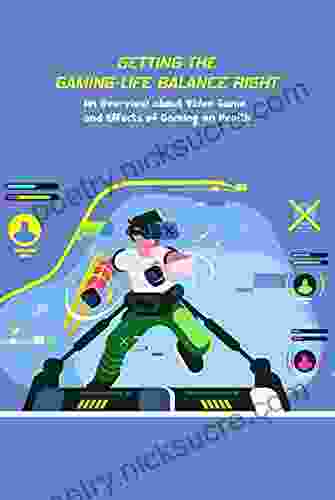
 Oliver FosterGetting the Gaming Life Balance Right: A Comprehensive Guide for Achieving...
Oliver FosterGetting the Gaming Life Balance Right: A Comprehensive Guide for Achieving... Chance FosterFollow ·14.3k
Chance FosterFollow ·14.3k Nathaniel HawthorneFollow ·15.7k
Nathaniel HawthorneFollow ·15.7k Dwayne MitchellFollow ·2.5k
Dwayne MitchellFollow ·2.5k Randy HayesFollow ·12.7k
Randy HayesFollow ·12.7k Javier BellFollow ·8.7k
Javier BellFollow ·8.7k Stan WardFollow ·9.5k
Stan WardFollow ·9.5k Harold PowellFollow ·9.6k
Harold PowellFollow ·9.6k Boris PasternakFollow ·15.4k
Boris PasternakFollow ·15.4k
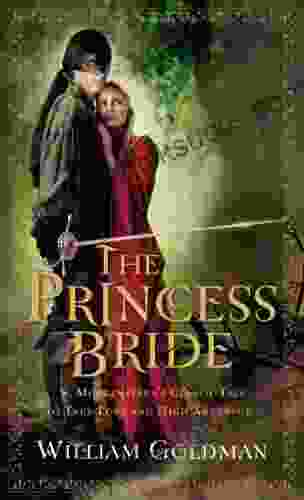
 Aldous Huxley
Aldous HuxleyMorgenstern: A Classic Tale of True Love and High...
Morgenstern is a...
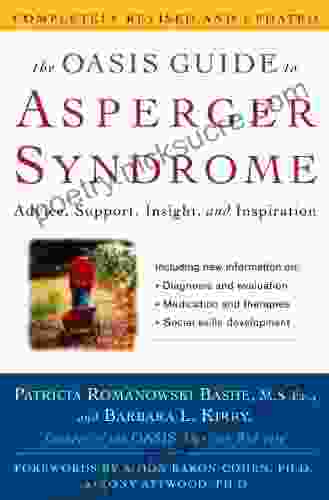
 Beau Carter
Beau CarterThe Oasis Guide to Asperger Syndrome
What is Asperger Syndrome? Asperger...
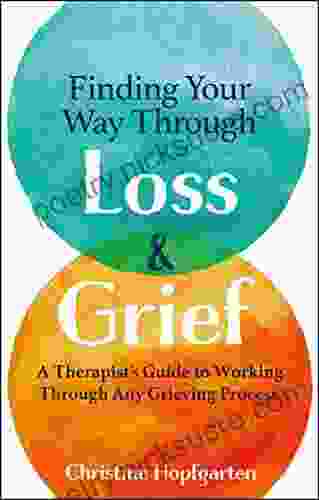
 Chadwick Powell
Chadwick PowellFinding Your Way Through Loss Grief: A Therapist S Guide...
Grief is a natural human emotion that we...
4.5 out of 5
| Language | : | English |
| File size | : | 4175 KB |
| Text-to-Speech | : | Enabled |
| Screen Reader | : | Supported |
| Enhanced typesetting | : | Enabled |
| Word Wise | : | Enabled |
| Print length | : | 118 pages |


